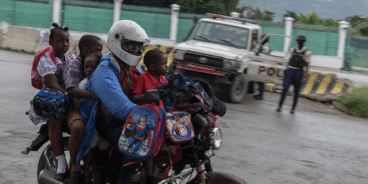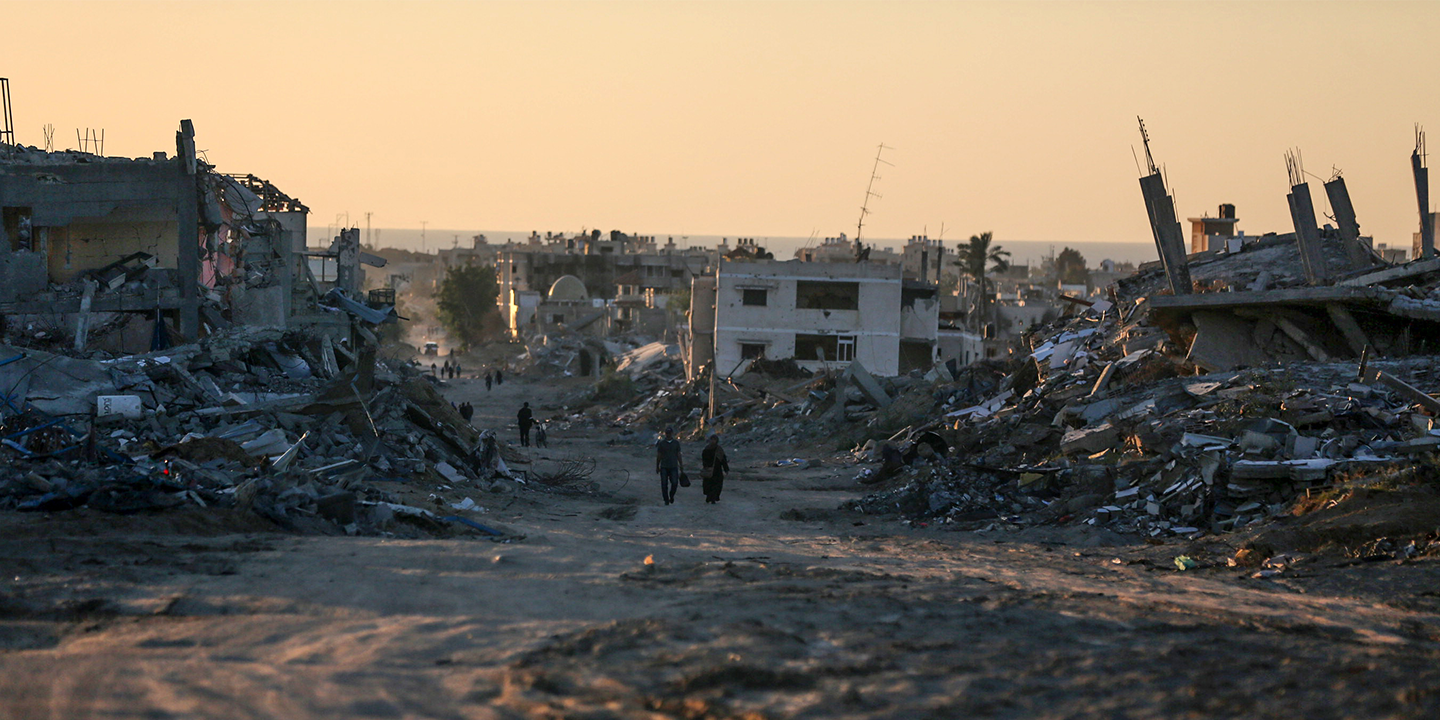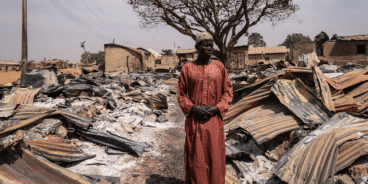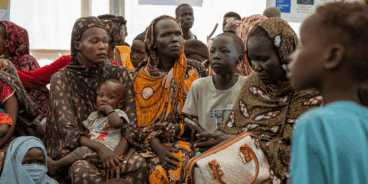

Urgent Call to Action: International Community Must Uphold the Responsibility to Protect the Palestinian People
For nearly two years, Palestinians in the Occupied Palestinian Territory (OPT) have been subjected to an unrelenting escalation of atrocity crimes perpetrated by Israel, with little to no reprieve, justice or protection. Famine is rapidly spreading, tens of thousands of Palestinians have been killed, nearly 90 percent of Gaza is under Israeli-militarized zones or forced displacement orders and there is clear evidence that the Israeli government is perpetrating mass atrocities, including genocide. The Global Centre for the Responsibility to Protect urgently calls on the international community to immediately and comprehensively implement the Responsibility to Protect in the OPT.
The norm of the Responsibility to Protect (R2P) seeks to ensure that the international community prevents and responds to genocide, war crimes, crimes against humanity and ethnic cleansing – often referred to as “atrocity crimes.” Twenty years ago, at the UN World Summit, heads of state and government unanimously and formally committed to uphold this responsibility – rooted in existing international obligations, including the Genocide Convention, Refugee Convention, human rights conventions and treaties and customary international law.
R2P and the obligations it entails have applied to the OPT since the inception of the norm. R2P’s first pillar commits states to protect all populations from atrocities, including through the adoption, implementation and institutionalization of measures aimed at preventing risks of such crimes arising in the first place. Israel’s discriminatory policies and practices targeting Palestinian populations, including apartheid policies, settlement expansion, illegal occupation and longstanding siege of Gaza, among others, have already demonstrated significant gaps in its willingness to uphold this norm.
Under R2P, when a state is manifestly failing to protect populations under its control, as in the case of Israel’s responsibilities as the occupying power in the OPT, the international community must be prepared to take appropriate collective action, in a timely and decisive manner, using all peaceful means and, where necessary, coercive measures. The applicability of this responsibility has only heightened over the past two years – including in the Occupied West Bank, including East Jerusalem, where Israel has escalated its administrative detention, excessive use of force and forced displacement while enabling violence by Israeli settlers. In Gaza, Israel has obstructed the delivery of aid, employed starvation as a weapon of war, deliberately targeted civilians and destroyed civilian infrastructure indispensable to life while committing crimes against humanity, war crimes and genocide. UN agencies and NGOs operating in the OPT have been subjected to operational restrictions, defunding and smear campaigns, while leading Palestinian rights organizations, critical in providing monitoring and documentation, have been sanctioned for their pursuit of justice and accountability.
Despite efforts by several UN Security Council (UNSC) members, particularly among the elected ten, to mandate meaningful action since October 2023, vetoes by permanent members have left the Council in a state of persistent deadlock. More recently, a voting pattern of 14-1 has been emerging as the United States continues to shield Israel despite overwhelming evidence of atrocities. Where deliberations have taken place or resolutions have successfully been adopted, the Council has predominantly been limited to reacting to the humanitarian catastrophe in Gaza, failing to adopt a more holistic outlook and eschewing an atrocity lens when humanitarians themselves, including Tom Fletcher, UN Under-Secretary-General for Humanitarian Affairs and Emergency Relief Coordinator, have called on states to act “decisively” to prevent genocide.
However, some states have indeed acted on their obligations under the Responsibility to Protect, employing a range of peaceful and coercive measures to uphold international law and protect the Palestinian people. This includes:
-
-
- South Africa’s decision in December 2023 to bring Israel before the International Court of Justice (ICJ) for alleged violations of the Genocide Convention.
- The establishment of the Hague Group by nine states pledging to coordinate measures to pressure Israel’s compliance with international law.
- Slovenia’s imposition of an arms embargo on Israel, weeks after declaring two Israeli ministers persona non grata.
- Ireland introducing legislation to ban trade with illegal Israeli settlements in the OPT.
- Colombia moving to cut diplomatic ties with Israel.
- Norway’s Sovereign Wealth Fund opting to divest from more than a dozen Israeli companies over ethical concerns.
-
All such measures, enacted in accordance with R2P – whether explicitly proclaimed or not – reflect the will of these states to address civilian protection needs. Nevertheless, these actions have largely been isolated and ad hoc, falling short of the comprehensive response to atrocity risks and crimes required under R2P. To uphold this commitment, states should exhaust all means available to confront the scale of suffering and injustice being perpetrated in the Occupied West Bank and Gaza.
At this critical juncture, the international community is confronted with a moment laden with moral weight, legal obligations and historical consequence. Many states, including those with deep influence, have failed in their obligations to uphold R2P and international law more broadly, including by continuing to arm, fund, trade with and shield Israel from accountability.
The genocide in Gaza lays bare the consequences of inaction and double standards in the face of crimes that shock the conscience of humanity – consequences R2P was explicitly designed to prevent. Mass atrocities are not inevitable, nor should they be treated as such; they are the culmination of years of unchecked risk factors and early warning signs that have been ignored or intentionally suppressed. For those remaining in Gaza, the window of opportunity to save lives and stop this destruction is rapidly closing. The time to act is now.
Over the last two years, the Global Centre and others have called for the implementation of the Responsibility to Protect, including Palestinian civil society organizations, the Gaza Tribunal, legal academics and former senior UN officials.
The international community must replace cautious incrementalism with unconditional adherence to the moral imperatives, political commitments and legal obligations underpinning the principled leadership demanded by R2P. The UNSC is not the only body tasked with upholding R2P and the protection of populations from mass atrocities. It is incumbent on the international community and all UN bodies, including the UN General Assembly (UNGA), to act on their duty to uphold R2P at all times and actively pursue avenues for prompt action. Where the UNSC continues to fall short in this responsibility, it becomes even more imperative for others to enhance their efforts.
To that end, the Global Centre urges UN member states to explicitly and resolutely uphold the Responsibility to Protect as a framework through which collective action for the OPT must be devised and coordinated. Such collective action should include:
-
-
- Urgently resume the 10th emergency special session of the UNGA, acting under resolution 377 A(V), “Uniting for Peace,” to adopt a resolution establishing a multinational protection force for the OPT, with a mandate determined by the Palestinian people, in line with their right to self-determination and with consent from the State of Palestine.
- Enforce a comprehensive arms embargo on Israel, prohibiting the direct or indirect sale, transfer, acquisition or supply of arms, munitions, dual-use items, technology and related military equipment, whether through state channels or private entities.
- Ensure the immediate, full, safe and unhindered delivery of humanitarian assistance and essential goods to people inside the Gaza Strip. This should be carried out by the UN-led humanitarian distribution system, in rejection of imposed alternative schemes militarizing aid, including any use of private military contractors.
- Guarantee the full, safe and unimpeded protective presence for UN agencies, humanitarian organizations, international media and the Office of the Prosecutor of the International Criminal Court across the entire OPT, including the Gaza Strip. International, independent investigative teams and human rights monitors must be granted immediate and unfettered access to Gaza to document and preserve evidence of crimes, as well as to reveal the extent of the crimes for future accountability and justice processes.
- Call for the immediate organization and deployment of a multilateral Diplomatic Humanitarian Convoy to the Gaza Strip through the Rafah Crossing. All member states should participate by dispatching official diplomatic missions to accompany humanitarian aid convoys and facilitate their safe entry into Gaza.
- Immediately review and terminate public procurement agreements, international investment partnerships, trade relations and all institutional cooperation that assists in sustaining Israel’s illegal occupation. Ban all trade with and investments in Israel’s illegal settlements in the Occupied West Bank, including East Jerusalem.
- Adopt and enforce comprehensive sanctions against Israel, encompassing political, economic and military measures, in line with the UN Charter and obligations under international law. These measures should aim to pressure Israel to comply with international law, end its illegal military occupation and dismantle its system of apartheid in the OPT.
- Create an ad hoc criminal accountability mechanism to investigate crimes committed by persons and corporations in the OPT since 1967 and support the establishment of an international mechanism to register the damages incurred by Palestinians for which the Advisory Opinion of the ICJ has ordered Israel to pay reparations.
-
Preventing future atrocities begins with recognizing and naming the conditions that enable them. This includes acknowledging the long-running Israeli state policy of subjugation, dispossession and fragmentation of the Palestinian people, as well as confronting their systemic dehumanization. True accountability demands a political process rooted in justice, inclusion and international law – not imposed solutions that exclude Palestinian agency.
Related Content


Atrocity Alert No. 469: Nigeria, Israel and the Occupied Palestinian Territory and South Sudan
